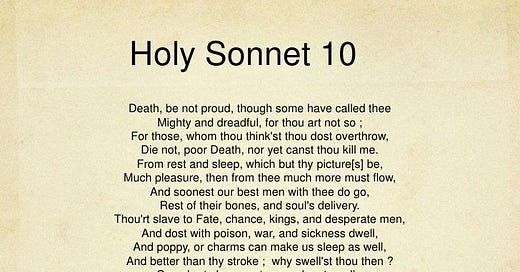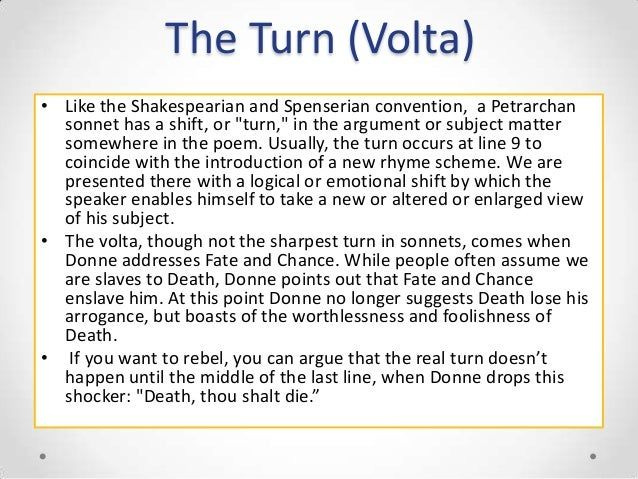Isaiah chapter 1:24-26
Here is the "turn" we've been waiting for. In poetry, as in John Donne’s sonnet above, when the mood shifts, it's called a “volta” or “turn.” Many passages in Isaiah are written like poetry, but since we don't speak Hebrew, it's hard to tell unless the translator does a good job and has a poet's phrasing.
One way we can tell that we should expect some poetical conventions is how the publisher breaks the lines. If it is a solid wall of text, it's a narrative, a history, possibly a vision but in narrated form. If the line breaks are frequent, it is more like a Psalm. It may have been given to Isaiah that way to make it easier to memorize (for Isaiah or those who heard him).
Sadly, we can’t expect rhyme or meter to help us in the English translations. But what we can expect to find are turns, comparisons, opposites, and parallels. These give greater insight into where the point of the passage lies.
Proverbs does this in a simple way:
Prov 24:16 For a righteous man may fall seven times and rise again,
But the wicked shall fall by calamity.
The point of this verse is focused on the comparison between righteous and wicked.
Isaiah 1:23 ended with a condemnation of Judah. Verse 1:24 leads into a startling opposite:
24 Therefore the Lord says,
The LORD of hosts, the Mighty One of Israel,
“Ah, I will rid Myself of My adversaries,
And take vengeance on My enemies.
God's disappointment in Judah leads Him to condemn His own enemies. Who are these enemies? Let's put it in human terms. If this were a noble husband who was being taunted about his erring wife-become-prostitute, what would he do?
25 I will turn My hand against you,
And thoroughly purge away your dross,
And take away all your alloy.
First, he would discipline his wife--get her attention through pain (not that I advocate wife-beating, but tough love is necessary sometimes, and Judah is going to have learn some things the hard way and go through some very hard times).
The Hand that protected her is going to grab her by the arm or hair or leg...whatever handhold presents itself...and drag her away from the scene of her temptation and crime, like Adam and Eve were thrown out of Eden. Judah will be thrown into Babylon, or scattered around the world, or in the end times taken away into slavery again.
Next, this husband is going to shut the mouth of the accusers by purifying his wife. He will put her into a refining fire like silver purified in a crucible, and the fear and heat and pain of the fire will burn away the dross. Right there, we have the destruction of the world by fire and how God will use it to purify His errant wife.
Side note: Fortunately for us, this is very different from how the church is purified by Jesus; His blood covers our sins when we repent of them and put our trust in His blood to make us clean. We suffer during our mortal lives, yes, but not like Judah is going to suffer in the fire. That should make us both thankful and solemn. We are told to pray for the peace of Jerusalem and the salvation of all Israel:
Psalm 122:6 Pray for the peace of Jerusalem:
“May they prosper who love you.” [i.e., who love Jerusalem]
Romans 11:25 For I do not desire, brethren, that you should be ignorant of this mystery, lest you should be wise in your own opinion, that blindness in part has happened to Israel until the fullness of the Gentiles has come in.
Romans 11:26 And so all Israel will be saved, as it is written:
“The Deliverer will come out of Zion,
And He will turn away ungodliness from Jacob
Praise God that we are the "fullness of the Gentiles" that was foretold by Paul! The foretold years are almost full, the Age of Grace is almost over; the harvest is ripe, and we will be gathered by Jesus shortly!
The rest of the "turn" in Isaiah 1:26 continues:
26 I will restore your judges as at the first,
And your counselors as at the beginning.
Afterward you shall be called the city of righteousness, the faithful city.”
Here is the Husband keeping his covenant, despite the unfaithfulness of his wife. After she is purified in the fire, He will restore her to righteousness, and she will be faithful.
When the Lord speaks of Jerusalem, it is as His covenant wife. The city is built on Zion, the peak right below Mount Moriah, where Abraham was willing to sacrifice Isaac because God told him to, but was stopped and provided a ram at the last minute to sacrifice in his son's place. This was a foreshadowing of the sacrificial Lamb of God, who would be crucified for the sins of the whole world, not just Abraham's descendants, next to the future site of the Temple Mount.
Conclusion: Isaiah 1:26 hints that the Son of God who is also the son of Abraham, Isaac, and Jacob, will die to make Jerusalem righteous. In the future, the blindness of the Jews will be removed, and they will see Jesus coming in power and glory to their rescue, and finally realize that He is their Messiah Redeemer. In their repentance they will mourn as for a firstborn son.
Zechariah 12:10 “And I will pour on the house of David and on the inhabitants of Jerusalem the Spirit of grace and supplication; then they will look on Me whom they pierced. Yes, they will mourn for Him as one mourns for his only son, and grieve for Him as one grieves for a firstborn.
Thus, the husband will make his wife pure, because all her debt and sin will be paid, and God will be avenged on the accusers (Satan and the other fallen angels), who will no longer be able to say that Judah is undeserving of the covenant.
Next up: Finishing chapter 1!
###




